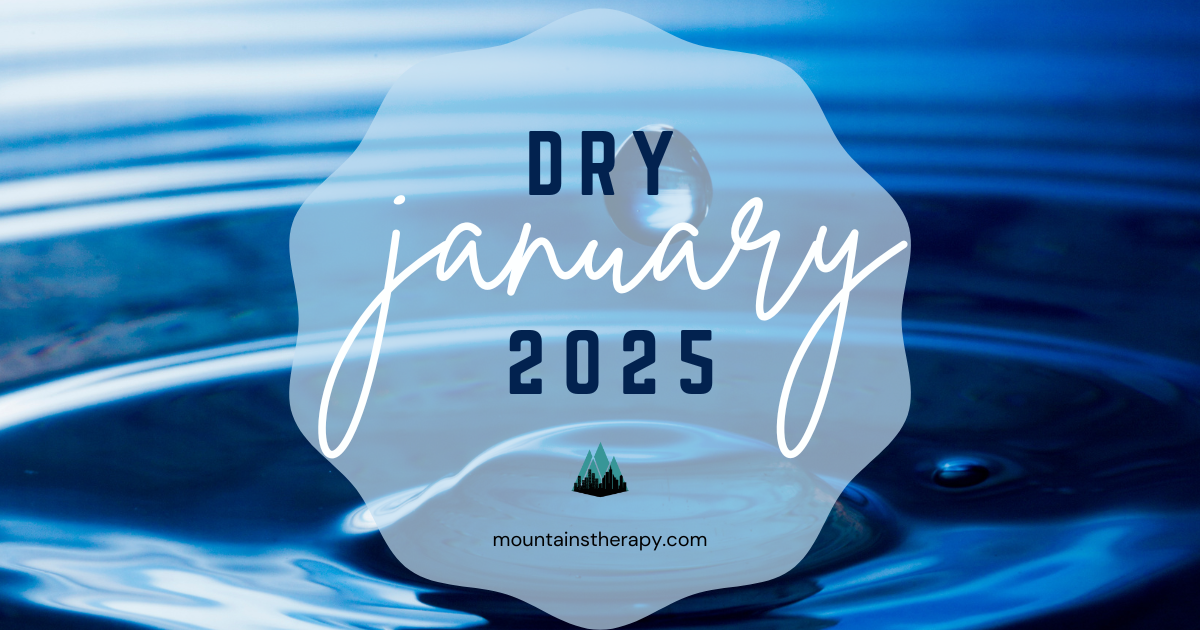Dry January 2025: A Refreshing and sober Start to the new Year
Learn more about Individual Therapy, Addiction Counseling and Substance Use and Alcohol Use Assessments.
In This Blog, You’ll Learn:
- What Dry January is all about
- How it impacts your body and mind
- Tips for a successful Dry January journey
- How to seek support for addiction and substance use disorders
- Clinical approaches to addiction counseling
What Is Dry January All About?
Mountains Therapy NJ, recently voted the Best Therapist of Montclair 2024 by The Montclair Girl, is here to help you explore Dry January, an annual challenge embraced by millions worldwide. Whether you’re curious about its origins, benefits, or the potential challenges, this blog has you covered.
Dry January is a month-long commitment to abstain from alcohol. Originally launched by Alcohol Change UK in 2013, it quickly gained global traction as a way to reset drinking habits and prioritize health. It begins on January 1st and concludes on January 31st, offering a fresh start to the new year.
Why Do People Participate in Dry January?
- Health Benefits: Improved liver function, better sleep, and clearer skin.
- Mental Clarity: A reduction in anxiety and improved focus.
- Social Exploration: A chance to engage in alcohol-free social activities.
How Does Dry January Affect Your Body?
Abstaining from alcohol can have profound physical and mental effects. While the benefits are significant, some people experience initial discomfort as their body adjusts: Here’s what might happen:
Positive Changes
- Improved Liver Health: Alcohol-free days allow the liver to regenerate, reducing inflammation.
- Better Sleep: Alcohol disrupts REM sleep. Going dry can improve sleep quality and energy levels.
- Enhanced Mood: Many participants report feeling more balanced and less anxious
Challenges to Expect
- Common questions and answers about the challenges to Dry January
- Can Dry January Cause Headaches? Yes, detoxing from alcohol may trigger headaches in the first few days.
- Can Dry January Make You Tired? Fatigue is common as your body recalibrates.
- Can Dry January Cause Constipation? Changes in hydration and diet might temporarily affect digestion.
- Can Dry January Be Dangerous? For individuals with alcohol dependency, sudden withdrawal can be risky. Always consult a medical professional before starting.
How to Seek Support for Addiction and Substance Use Disorders
Dry January can bring attention to your relationship with alcohol. For some, this journey may reveal deeper struggles with addiction or substance use. If that resonates with you, remember: support is available.
- Reach Out for Help: Mountains Therapy NJ offers Substance Use and Alcohol Use ASAM evaluations, whether court-ordered or self-initiated. Mountains Therapy NJ offers Substance Use and Alcohol Use ASAM evaluations, whether court-ordered or self-initiated.
- Connect with Resources: Local support groups like Alcoholics Anonymous (AA) and SMART Recovery provide community and guidance.
- Seek Professional Therapy: A licensed therapist can help you address the underlying factors contributing to substance use.
- Seek Specialized Therapy: We provide access to a licensed alcohol use therapist or alcohol use counselor to guide you through recovery.
- Explore Holistic Options: Engage in alcohol use mental health therapy with an experienced alcohol use mental health therapist to address underlying challenges.
Taking the first step is courageous, and you don’t have to do it alone. If you or someone you know needs support, contact us at 201-588-3776 or email info@mountainstherapy.com.
Clinical Approaches to Support Addiction Counseling
If Dry January has made you question your relationship with alcohol, clinical interventions can provide deeper insight and long-term solutions. At Mountains Therapy, we use evidence-based therapeutic approaches to address addiction and substance use.
- Cognitive Behavioral Therapy (CBT)
- A Cognitive Behavioral Therapy CBT therapist uses a structured, goal-oriented approach to help clients identify and change patterns of thought and behavior related to alcohol use. It’s especially effective in managing triggers and developing healthier coping strategies.
- Emotion Focused Therapy
- An Emotion Focused Therapy EFT therapist helps individuals explore the emotions driving their alcohol use, fostering better emotional regulation and healthier interpersonal relationships.
- Mindfulness-Based Therapy
- A Mindfulness-Based Therapy therapist teaches mindfulness techniques to help clients stay present, reduce anxiety, and manage cravings. This approach is an excellent complement to addiction counseling.
- Psychodynamic Therapy
- A Psychodynamic therapist assists clients in uncovering underlying emotional conflicts and past experiences contributing to substance use. This approach promotes deeper insight and long-term healing.
Tips for a Successful Dry January
- Set Clear Goals: Reflect on why you’re doing Dry January—better health, mental clarity, or just a challenge.
- Stay Hydrated: Drink plenty of water to combat headaches and fatigue.
- Seek Support: Share your journey with friends or join an online community for accountability.
- Celebrate Milestones: Reward yourself for small victories to stay motivated.
What Happens When Dry January Is Over?
The end of Dry January isn’t the end of your journey. Use this time to reflect on the experience:
- Did you feel healthier and happier?
- What habits do you want to maintain?
- How will you approach alcohol in the future?
Why Dry January Is Worth It
Dry January can be a powerful step toward greater wellness. Even if it’s challenging at times, the benefits—both immediate and long-term—are well worth the effort. From improved physical health to mental clarity, taking a break from alcohol allows you to reconnect with your body and mind.
Mountains Therapy NJ: Here to Support You
At Mountains Therapy NJ, we understand the importance of mindful living and personal growth. If you’re exploring Dry January and notice it brings up deeper questions about your relationship with alcohol or your mental health, our compassionate team is here to help. Contact us at 201-588-3776 or email us at info@mountainstherapy.com to start your journey to wellness. Let’s toast (with sparkling water!) to a healthier, happier you. Cheers to Dry January!











